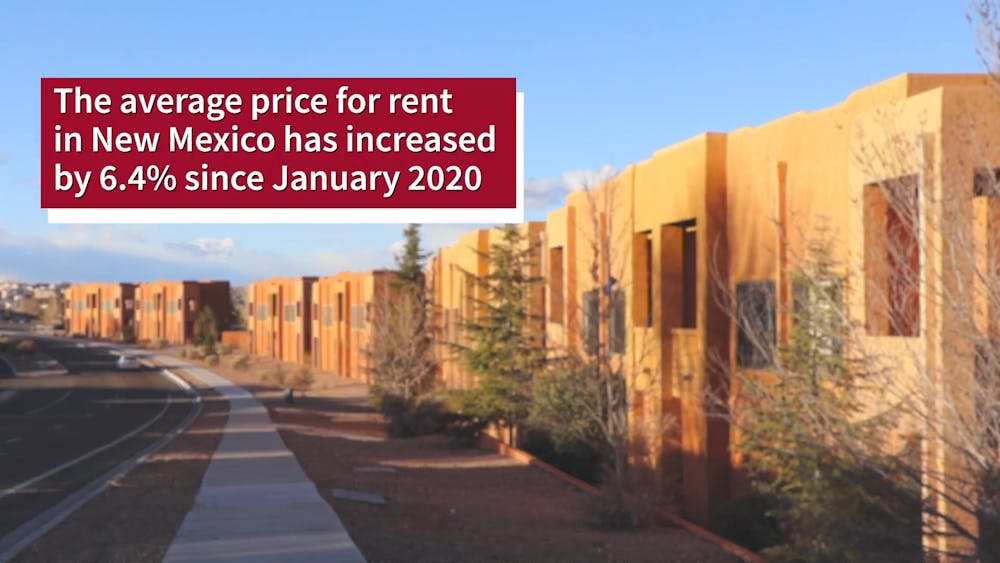The price of rent in New Mexico has been steadily increasing for decades due to high demand and fewer and fewer vacancies. Now, low income residents are struggling to keep up with more expensive rental rates and the ongoing pandemic is only making matters worse.
As of January 2021, the average cost of rent in Albuquerque was $982 for approximately 812 sq. ft., according to the rental market trends from RentCafe. That’s a 7% increase from the previous year, but prices can rise even higher with the addition of extra bedrooms or a desirable neighborhood.
Thunderbird Property Management broker Melissa Benevegna said people from out of state saw how New Mexico’s infection rates weren’t as severe as some of the other COVID-19 hotspots in the country. As a result, they jumped on the opportunity to move to New Mexico even though rental rates were lower in other areas. Once landlords caught on to the trend, the price of rent spiked across the state.
“We seem to be at this interesting juxtaposition where we have Amazon coming to town, we have Netflix announcing they’re going to build an additional 300 acres, we have lots of construction happening but none of it available yet,” Benevegna said. “Because COVID kind of put New Mexico on the map, we have a lot of people coming in from places we don’t normally see them coming in from.”
Lorraine Nobes is a renter who’s been living in Rio Rancho since 2014 but, with her son and daughter now in high school, she said the house they live in is starting to feel cramped. Unfortunately, the landlords keep raising the rent at the end of every lease and it’s been difficult to find anything else in the area.
“We were looking for something bigger because my children have grown in the seven years that we’ve been here,” Nobes said. “This is a very small house and we were looking for a different option but that’s not really available around here, within a reasonable price range.”
Nobes is currently paying $1,350 a month — she tried negotiating the rent after she lost some of her income but said the landlord wouldn’t go any lower.
“I had been previously paying $1,250 last year and when I moved in, it was only $1,100,” Nobes said. “So it may just be common inflation, and they keep saying it's the comparable sales in the area, but there's really no other option. If I got the same size house, it would be $1,600 anywhere else in the (Rio Rancho) area.”
The high demand for affordable housing has created what managers call a seller’s market. Because of the demand to find housing, landlords can easily raise the price knowing that someone with a higher income will take it. This makes it difficult for local tenants to relocate at the end of their lease, because even if they don’t like their current residence, all the other available rentals are too expensive for a minimum-wage budget.
“When there’s a low inventory with a lot of demand, prices go up,” Benevegna said. “Unless we get more houses on the market, or we build more houses to balance that back out, prices are going to be high.”
With so many people struggling to stay on their feet after losing their jobs, the state Supreme Court temporarily paused evictions for New Mexicans who could prove they were unable to pay rent due to a COVID-related issue. The court order means nothing, though, if tenants don’t fully understand the state judicial system.
“The problem is that the laws are not really well understood by the general public so there’s a lot of abuses by landlords unfortunately,” Julian Trujillo, a volunteer and organizer with the Renters Coalition of Albuquerque, said. “The Supreme Court order requires a lot of work from the tenant that is not explicitly stated.”
Get content from The Daily Lobo delivered to your inbox
Trujillo said tenants still have to communicate with their landlord through documented conversations about their issues or concerns about paying their rent. He added that the federal CDC eviction moratorium requires you to submit paperwork to your landlord proving that you have been affected by the pandemic.
Benevegna said Thunderbird Management tries to cooperate with all of their tenants, but if a renter doesn’t respond to any warnings, the company has to issue a court date and let the judge decide whether their lease should be terminated. If the tenant doesn’t participate in a hearing before a judge and provide sufficient evidence that they are unable to pay rent, they could still risk being evicted.
Benevegna said they do everything they can to keep all of their tenants housed, such as offering payment plans and directing struggling renters to resource programs that offer relief funds or loans to those who need help getting back on their feet.
Daniel Ward is a senior reporter at the Daily Lobo. He can be contacted at News@dailylobo.com or on Twitter @wordsofward34






